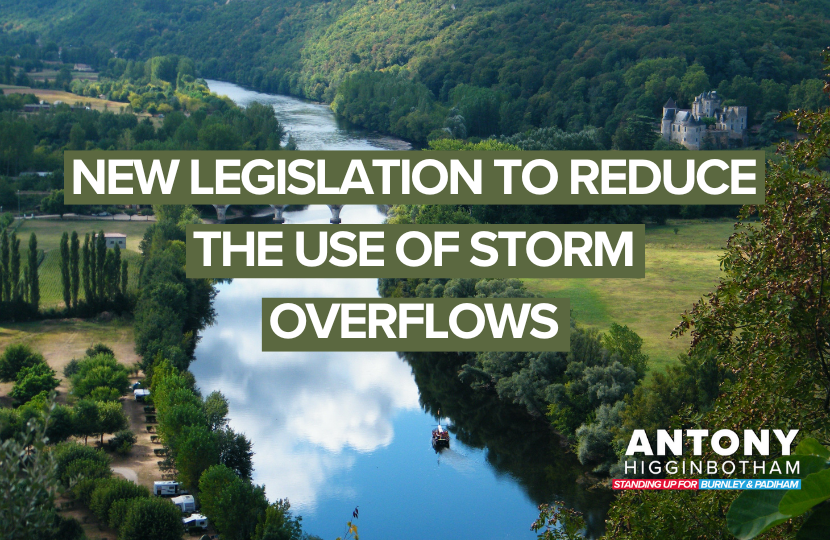
Burnley & Padiham’s MP Antony Higginbotham has today backed the next stage of the government’s plan to tackle sewage pollution by enshrining a target to improve sewage overflows into law.
In August 2022 the government set out its Storm Overflows plan which requires the largest infrastructure programme in water company history to tackle sewage overflows – an estimated £56bn. The plan prioritises investments in priority sites including protected habitats and bathing waters. In April, £1.6 billion investment was brought forward to speed up vital water infrastructure projects, cutting thousands of overflow spills each year.
Ministers also reconfirmed that they will be lifting the cap on civil penalties for water and sewerage companies, raising them up to unlimited penalties so that polluters pay for their impact on the environment, with funds now being reinvested into further improving rivers and water bodies. Today’s announcement will place the improvement targets in the Storm Overflows Reduction Plan on a statutory footing, making them legally binding.
Secretary of State Therese Coffey MP said:
“It was a Conservative government that will deliver 100 per cent monitoring of storm overflows. We’ve brought forward stronger regulations, tougher enforcement and the largest water infrastructure programme in history – an expected £56 billion investment – and we will make fines unlimited so that the polluter always pays.”
The Environment Secretary has written to water companies requiring a plan on every overflow on her desk by the end of June. This builds on work to introduce mandatory monitoring, which is up from just 7% in 2010 to 100% by the end of this year. Thanks to this monitoring, regulators are undertaking the largest investigation into water companies in their history related to illegal sewage dumping, building on record fines of £141m secured since 2015.
Antony Higginbotham MP said,
“Residents across Burnley and Padiham are rightly disgusted by sewage in our rivers, and so am I. I’ve been clear that United Utilities must clean up their act now, and if they don’t I urge ministers to use the full force of the law, including unlimited penalties.”
Meanwhile, the Labour Party have today tabled legislation which directly replicates existing government policy. This includes:
- Bringing in monitoring, which will already be complete by the end of the year;
- Requiring a plan to be published, which the government already set out last year;
- Setting legal targets, which the government has already committed to do; and
- Introducing automatic fines, which reduces the fine available to regulators, rather than increasing them to unlimited as the government will do.
Commenting on this, Antony Higginbotham MP said,
“this is yet another political gimmick from the Labour Party. We deal in action, they deal in press releases. But it’s what have come to expect from a party that parachuted in an inner-city councillor to stand for them at the next election, because they don’t understand the British people and they don’t understand Burnley & Padiham.”
“Ultimately my priority is delivering for residents right across Burnley and Padiham. The latest legislation from Government will do that, forcing United Utilities to get their act together, whilst also ensuring properties and businesses in areas like Padiham remain protected in the event of flooding.”
Background
- The Storm Overflows Discharge Reduction Plan, published in August 2022, is available at https://assets.publishing.service.gov.uk/government/uploads/system/uploads/attachment_data/file/1101686/Storm_Overflows_Discharge_Reduction_Plan.pdf.
- The Plan for Water was also published earlier this month, and this tackles the various sources of pollution into water including from storm overflows, agriculture, plastics, rroad un-off, and chemicals; as well as the pressures on water resources as a result of hotter, drier summers and population growth, This is available at
- Storm overflows are used during periods of heavy rainfall, when the sewage system is running at capacity, to prevent untreated water coming up through road drainage and home appliances connected to the sewer system. This problem arises because the sewage pipes used to carry rainwater from roads and properties, is the same system used to carry sewage waste from properties.
- Since 2010 monitoring has been installed on almost 100% of storm overflow pipes, up from 7% in 2007. This has allowed for far greater transparency, scrutiny and enforcement action is now planned.



